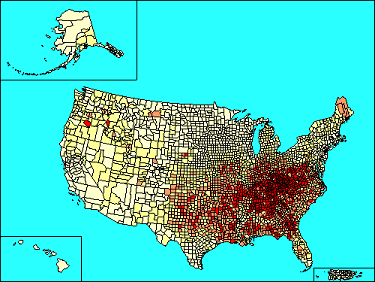Matt Yglesias posted an interesting map the other day:
It’s a map drawn from US Census bureau data on ethnicity and ancestry. According to the census, however, some 7% of Americans look puzzled when you quiz ’em about their ancestry and write American rather than “Irish” or “Polish” or Korean” or “Cuban”. This map shows where those American-Americans live, leading Matt to argue, vis a vis Jim Webb’s prospects for the Vice-Presidency, that “Webb’s favorite ethnic group, in short, seems to be the ethnic group with the least ethnic consciousness.” (I concur with Matt, incidentally, in recommending Eve Fairbanks’ fine Webb profile in this week’s New Republic)
Well, yes, and that’s one of the reasons Webb felt compelled to write his history of the Scots-Irish in America, Born Fighting. It’s precisely because he felt that his ain folk were, to borrow from Ian Fleming, “a tough, forgotten race” that Webb leapt into the fray.
Still, if you were to plot Scottish (and Ulster) immigration to the US on a map, you’d end up with something similar to the “American” map above. And that goes some way towards explaining why there’s no significant Scottish political constituency in the United States. Equally, though some Scots and Ulster immigrants (the latter mainly Scots who’d been in Ulstr for a generation or two) left for the New World involuntarily, many more did not. They were leaving for a reason and had little cause to look back with sentiment.
And of course, they left a long time ago (emigrants from post-WW1 Scotland, tended to head to Canda or New Zealand) and, being for the most part practical protestants, they did not so much assimilate into America as build it in the first place. No wonder, then, that despite the St Andrews’ and Caledonian Societies scattered across America there’s never been much of a Scots Lobby in American politics. The SNP, of course, would love it if there were such a lobby. But there are no collection tins being passed around Appalachian churches or in the bars of Columbia or Knoxville.
Equally, it’s precisely because the descendents of these immigrants from lowland Scotland, Ulster (and the counties of northern England) consider themselves unhyphenated Americans that they have harboured, I’d suggest, suspicions of those more recent arrivals who consider themselves “ethnics” or otherwise hyphenated-Americans.
Anyway, one other thought with regard to immigration: does anyone know of a study comparing assimilation rates between immigrants who left their home countries willingly and those who, for whatever reason, were compelled to leave? My suspicion – and it is only that – would be that Mexicans arriving in the United States seeking economic advancement (and planning to stay permanently) are likely to become unhyphenated-Americans more quickly than, say, those forced out of their home countries for other reasons (eg, the Cuban community in Florida). But that’s just a guess…








Comments